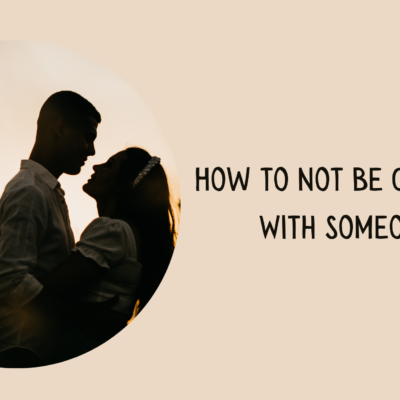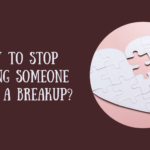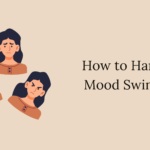How to not be Obsessed With Someone: Being deeply enamored with someone can feel exciting, especially in the early stages of a relationship or crush. However, when those feelings cross into obsession, it can become unhealthy, affecting your mental well-being, your life outside the relationship, and even the relationship itself.
Obsessing over someone can lead to anxiety, unhealthy behaviors, and an overwhelming preoccupation with the other person. If you’ve found yourself in a situation where you feel overly fixated on someone, it’s essential to recognize the signs and take steps to regain balance in your life. This guide will help you learn how to not be obsessed with someone by offering practical tips for reclaiming your emotional well-being.
Also Read:
How to not be Obsessed With Someone?
1. Recognize the Signs of Obsession
The first step in breaking free from obsession is acknowledging that you are indeed obsessed. Some common signs of obsession include:
- Constantly thinking about the person, even when you’re not around them.
- Stalking their social media profiles or regularly checking for updates.
- Becoming anxious or upset when they don’t reply to messages right away.
- Imagining scenarios or conversations with them, even when they are not part of the interaction.
- Neglecting other aspects of your life, like work, friends, or hobbies, because you’re focused on them.
- Putting the person’s needs and desires ahead of your own to an unhealthy degree.
Recognizing these behaviors is the first step toward regaining control of your thoughts and emotions. Obsession often comes from a place of insecurity or an unmet need for validation, and it’s important to address the root cause of these feelings.
2. Take a Step Back and Gain Perspective
When you feel yourself becoming consumed by thoughts of someone, it’s crucial to take a step back and gain perspective on the situation. Ask yourself if the level of focus you have on this person is healthy or sustainable. Is this someone who is truly deserving of your constant attention, or are you idealizing them in a way that disregards reality?
Consider what the relationship or connection actually is. Are you in a romantic relationship, or is this more of an infatuation or a crush? Sometimes, we get caught up in fantasies and projections about a person that aren’t based on who they really are. By taking a step back, you can remind yourself of their actual traits, flaws, and limitations, and avoid turning them into an unattainable ideal.
3. Set Healthy Boundaries
One of the key factors in avoiding obsession is establishing clear and healthy boundaries with the person you’re fixated on. This could involve:
- Limiting the amount of time you spend communicating with them.
- Reducing the frequency of your social media checks or interactions.
- Respecting their need for personal space and time, without taking it personally if they’re not always available.
- Recognizing that they may not feel the same level of attachment or interest as you do.
Setting boundaries also means recognizing and respecting your own needs. Are you sacrificing your time, emotional energy, or well-being for someone else? Are you losing touch with your own interests and desires? Boundaries protect both parties from unnecessary emotional strain and promote mutual respect.
4. Focus on Yourself and Your Own Life
One of the best ways to avoid obsessing over someone is to redirect your focus back onto yourself. Reclaim your sense of self-worth and independence by investing in activities that bring you joy and fulfillment. This can include:
- Pursuing hobbies and interests: Reconnect with things that you love doing, whether it’s reading, painting, cooking, or exercising. By immersing yourself in activities you enjoy, you’ll have less time to think about the person.
- Nurturing your relationships: Spend quality time with friends and family who provide support and care. A strong social network will remind you that you are valued beyond your relationship with this person.
- Focusing on your goals: Channel your energy into your career, education, or personal development. Whether it’s learning new skills or advancing in your job, setting goals and working toward them will give you a sense of purpose.
- Practicing self-care: Take care of your emotional and physical health by eating well, getting enough sleep, and engaging in regular exercise. Feeling good about yourself physically will improve your mental and emotional state, making you less likely to feel consumed by someone else.
When you focus on improving your own life, it will not only help you stop obsessing over others, but it will also make you more attractive to others, fostering healthier, balanced relationships.
5. Understand the Difference Between Love and Obsession
It’s important to distinguish between love and obsession. Healthy love is built on mutual respect, trust, and care for each other’s well-being. Obsession, on the other hand, is characterized by an unhealthy fixation on the person, often driven by insecurity or a desire to control the relationship.
Love involves allowing the other person to be their true self, while obsession often involves trying to mold them into your idea of perfection or projecting unrealistic expectations. Love promotes individual growth, while obsession tends to restrict freedom and creates unnecessary dependency.
By understanding these differences, you can begin to recognize whether your feelings for someone are rooted in genuine affection or an unhealthy obsession. A balanced relationship should make you feel happy, secure, and valued, not anxious or consumed.
6. Limit Social Media Interaction
Social media is a powerful tool that can intensify feelings of obsession. It provides a constant stream of updates and information about the person you’re fixated on, making it easy to get caught up in their lives, sometimes even more than your own. Constantly checking their profiles or stalking their posts can create an unhealthy attachment and further fuel obsessive thoughts.
Consider unfollowing or muting their accounts temporarily, so you’re not constantly exposed to their updates. This doesn’t mean you have to cut them off completely, but giving yourself space from their social media presence can help you focus on your own life and reduce unhealthy comparisons.
7. Seek Professional Help if Needed
If you’ve tried everything and still find yourself unable to stop obsessing over someone, it may be time to seek professional help. A therapist or counselor can help you explore the deeper emotional issues at the root of your obsession, such as low self-esteem, attachment issues, or unresolved trauma.
Therapy can provide you with the tools and strategies you need to manage your emotions and create healthier relationships in the future. In some cases, obsessive behaviors can also be tied to conditions like obsessive-compulsive disorder (OCD), and a mental health professional can help diagnose and treat such conditions.
8. Give It Time
Overcoming obsession is not something that happens overnight. It takes time, self-reflection, and patience. Allow yourself the grace to move through this process at your own pace. Healing is a journey, and the more you focus on your own well-being and practice the steps above, the easier it will become to regain control of your thoughts and feelings.
Remember that the person you’re obsessing over is just one part of your life, not the entirety of it. As time passes, your attachment will likely lessen, and you will find greater peace and clarity.
Conclusion
Obsessing over someone can be a difficult and draining experience, but it is not an insurmountable one. By recognizing the signs of obsession, setting healthy boundaries, focusing on your personal growth, and practicing self-care, you can regain control of your emotional life and stop the fixation. It’s important to understand that while feelings of attraction or attachment are natural, obsession can be harmful to both you and the other person. By taking the necessary steps to overcome obsession, you can foster healthier relationships and develop a stronger sense of self-worth, leading to a more balanced and fulfilling life.








